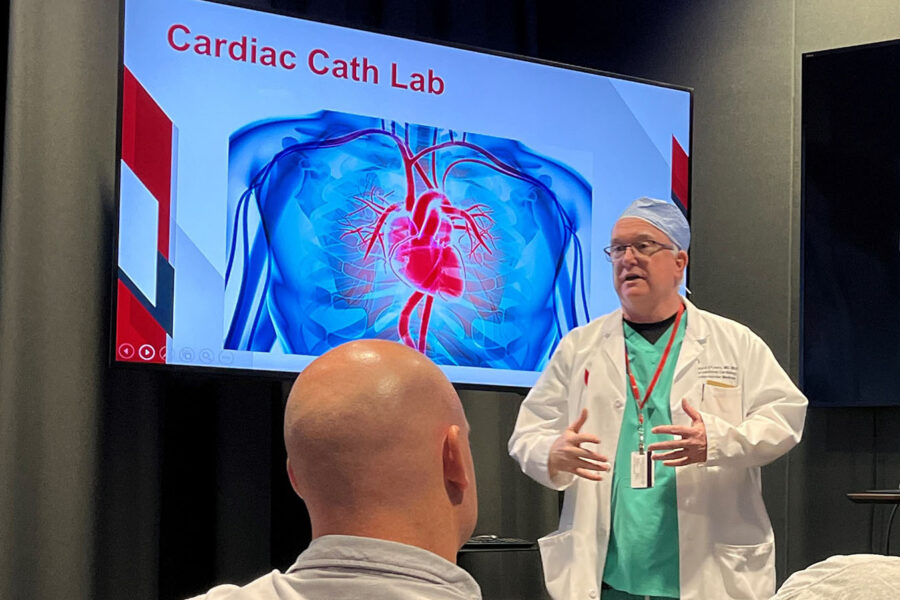UNMC drew 40 emergency medical responders to the Davis Global Center on Oct. 4 for the Activate EMS Symposium.
The event focused on urgent issues in cardiac arrest and stroke care, offering insights from UNMC and Nebraska Medicine’s professionals in those fields. It was hosted by the iEXCEL program, adding a dose of UNMC’s health care simulation capability to the experience.
Participants came to the UNMC Omaha campus from a number of smaller rural and volunteer emergency rescue departments from across eastern and central Nebraska.
Debbie Von Seggern, emergency medicine program coordinator with the UNMC Center for Continuing Education, said EMS services are part of the chain of the health care system, and all departments, including in rural areas, experience patients with strokes and heart attacks.
“Our campus is 500 miles wide, and it follows the mission of UNMC that we do this,” Von Seggern said.
Participating faculty included:
- Daniel Surdell, MD, and William Thorell, MD, professors in the UNMC Department of Neurosurgery and co-directors of the Nebraska Medicine Stroke and Neurovascular Center.
- Robert Garvin, MD, and Shabaz Malik, MD, assistant professors in the UNMC Division of Cardiovascular Medicine.
- Edward O’Leary, MD, associate professor in the UNMC Division of Cardiovascular Medicine and medical director of the Cardiovascular Catheterization Laboratory and of Chest Pain Services.
The event included a presentation on cardiogenic shock, a look at two hemorrhagic case studies and panel discussions on cardiac and neurology issues. Six breakout sessions discussed such topics as current practices in out-of-hospital cardiac arrest and brain anatomy as seen through iEXCEL’s 3D virtual glasses.
In one session, Dr. O’Leary reviewed coronary cases with visiting emergency medical personnel. In another, Dr. Thorell and Carlos Alvarez, MD, a neurovascular fellow with the UNMC Department of Neurosurgery, showcased the Penumbra device for clearing brain clots through a mechanical thrombectomy.
Scott Burgett, a volunteer EMT firefighter with Lyons Fire and Rescue, said UNMC’s training is great because of the vast knowledge that the presenters offer.
“Here you have the doctors that experience it and experience it on a higher volume,” he said. “So they have a lot more knowledge and more cases that they could discuss.”
Said Darren Lytle, an EMT firefighter with Tekamah Fire and Rescue, “This is vital for what we do.”

I have been a patient in two of the best university hospitals numerous times. Mostly Neurosurgery. But NEVER received the care I got in their hospital. I’ve had 8 operations on my spine. I need Lumbar Surgery for the third time. They did the last one. Now I think we’re talking cube, plate and screws.
This is a Magnet Hospital, given the highest level of nurses that are there and the new ones coming in. It’s all about the nurses, and they were AWESOME.
I’m an Ortho-trauma nurse. I had the best care ever here.
I was treated with respect in every way. My pain was well treated and they treated me as an addict.
I look forward to hearing back from them.